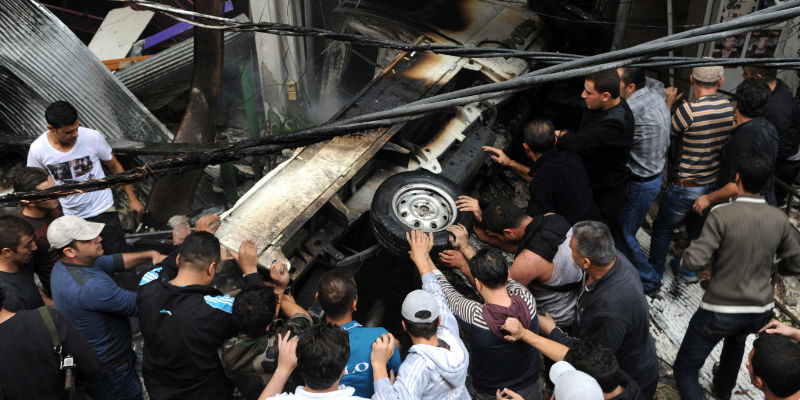
This photo released by the Syrian official news agency SANA, shows Syrians pushing a burnt car at the scene after a blast occurred according to footage and reports shown on State-run Al-Ikhbariya television in the Mazzeh al-Jabal district of the Syrian capital Damascus, Syria, Monday, Nov. 5, 2012. Several people were killed and injured, among them children, Al-Ikhbaria said. AP Photo/SANA
DAMASCUS—Syrian rebels launched a devastating car bomb attack Monday that killed 50 pro-regime fighters, a watchdog said, as air strikes pounded rebel positions and the opposition held talks on an overhaul.
The suicide car bomb attack on a military post in the central province of Hama struck early Monday, killing at least 50 government troops and loyalist militiamen, the Syrian Observatory for Human Rights said.
The attack was one of the deadliest on pro-regime forces since the start of the uprising against President Bashar al-Assad’s rule in March last year.
State television and the Britain-based Observatory said a car bomb attack had also killed 11 people and wounded dozens in the west Damascus district of Mazzeh, home to many embassies and state security offices.
Regime aircraft meanwhile continued to pound rebel-held positions around the country, with one air strike killing at least 20 rebel fighters in the town of Harem in the northwestern province of Idlib, the Observatory said.
The rebels have scored significant gains in recent weeks and hold swathes of territory in the north, but have come under intense bombardment from the air as Assad’s regime seeks to reverse its losses.
An air strike in the Idlib province town of Kafr Nabal killed 14 civilians, the Observatory said, with a video posted on the Internet by activists showing rescuers carrying blood-soaked bodies amid burning cars and uprooted trees.
“Bashar, even if you kill us all, we will stay determined to bring you down!” one man shouts in the video.
Fighting also erupted in southern districts of the capital on the edge of the Yarmuk Palestinian refugee camp, the Observatory said, with Palestinian sources saying 31 people had died from shelling at the camp on Sunday and Monday.
In second city Aleppo, fighting broke out at a roundabout at the northwestern entrance to the city in Zahraa district and on the airport road to the southeast, the Observatory and residents said.
Nationwide, at least 122 people were killed in Monday’s violence, the Observatory said.
The bloodshed added urgency to a meeting of the Syrian National Council in Qatar, where the United States is reportedly pressing for a new umbrella organisation to unite the fractured opposition.
According to the reports, which emerged after US Secretary of State Hillary Clinton said the SNC was not representative, long-time dissident Riad Seif is touted as the potential head of a new government-in-exile dubbed the Syrian National Initiative.
Seif on Sunday denied planning to head such a government, while SNC chief Abdel Basset Sayda denounced what he called “efforts to bypass the SNC”.
At Monday’s, SNC members approved a restructuring that will see the organisation add 200 new members representing 13 different political groups.
On Tuesday, SNC members will debate a proposal put forward by Seif to create a new political body to represent the opposition, folding in the SNC and other anti-regime groups.
The initiative will top the agenda of a broader meeting on Thursday called by Qatar and the Arab League.
The SNC has accused Washington of undermining the revolt and “sowing the seeds of division” by seeking its overhaul.
On the diplomatic front, Russian Foreign Minister Sergei Lavrov accused countries that support the Syrian rebels of encouraging them to fight rather than pressuring them to negotiate.
Russia, one of the Syrian regime’s most influential foreign allies, held no sway over the rebels, Lavrov said at a news conference in Cairo with his Egyptian counterpart Mohammed Kamel Amr.
Countries that do have influence over the rebels, among them some Gulf Arab states and Western powers such as the United States, should encourage them to “sit at the negotiating table,” Lavrov said.
Some of those countries prefer to “unify the rebels not on the basis of negotiations but on the basis of continuing the fighting,” he said.
Russia and China have stymied Western- and Arab-backed efforts to put more pressure on Assad’s regime by blocking UN Security Council resolutions.
British Prime Minister David Cameron on Monday lashed out at the United Nations for its failure to take a strong stance against the Syrian regime.
“I think in the case of Syria, the United Nations has let the world down,” Cameron said during a visit to the United Arab Emirates.
“You know that Bashar al-Assad cannot possibly stay running his country… He has to go,” he added.
The Observatory says more than 36,000 people have died since the uprising against Assad’s rule broke out, first as a protest movement inspired by the Arab Spring and then as an armed rebellion.